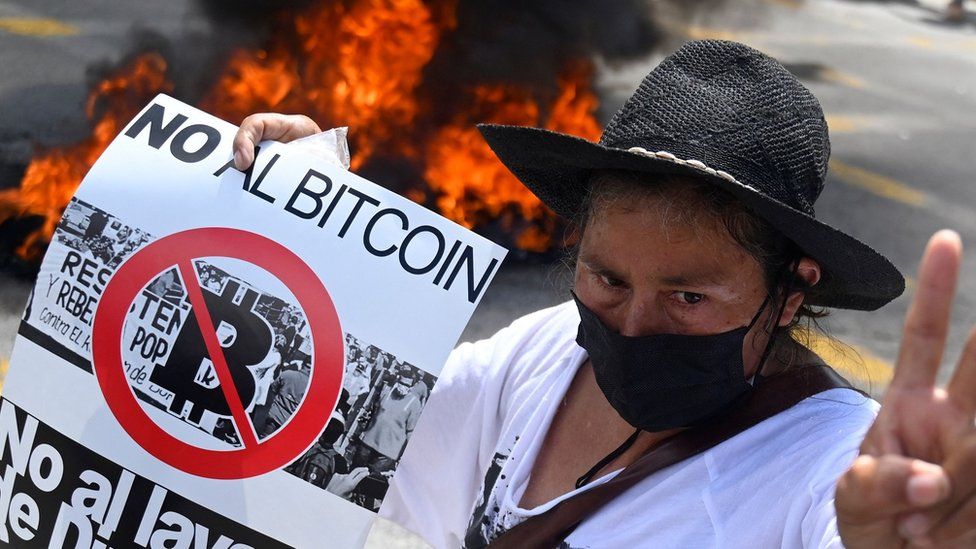Imagine a nation making history, diving headfirst into the world of cryptocurrency by adopting Bitcoin as legal tender. Sounds revolutionary, right? Well, in El Salvador, this bold move has ignited a firestorm of protests, revealing the complexities and challenges of embracing digital currencies on a national scale. Let’s delve into what’s happening in this Central American nation and what it means for the future of Bitcoin and crypto adoption worldwide.
Why the Uproar in El Salvador?
Last week, El Salvador etched its name in the crypto history books by becoming the first country to officially recognize Bitcoin alongside the US dollar. President Nayib Bukele’s decision, while groundbreaking, has been met with a mix of excitement and apprehension, culminating in recent public demonstrations.
El Salvador Explodes in Protest: What Exactly Happened?
On Wednesday, the anniversary of El Salvador’s independence, thousands of citizens took to the streets to voice their discontent. The most symbolic act of protest? The burning of a Bitcoin ATM in the capital, San Salvador. Think about it – these ATMs, numbering around 200 nationwide, were intended to be a cornerstone of this new financial system. This act of defiance speaks volumes.
Protesters weren’t just setting things ablaze; they were making their voices heard, holding signs that read “Respect the Constitution” and a clear “No to Bitcoin.” They feel their concerns are being ignored, and the forced adoption of Bitcoin is a step too far.
President Bukele’s Response: Accusations and Defiance
President Bukele didn’t take the protests lying down. He took to Twitter, criticizing the demonstrators and accusing them of vandalism. He even shared a video seemingly showing a masked woman damaging property, further fueling the debate.
During a televised bicentennial event, Bukele went a step further, alleging that the “international community” was funding some of the protestors. These are strong claims, highlighting the deep divisions and international scrutiny surrounding El Salvador’s Bitcoin experiment.
Who Are the Voices of Dissent?
The protesters aren’t a homogenous group. They include a diverse range of people:
- Peasants
- Laborers
- Union organizers
Natalia Belloso, a 41-year-old protester, articulated a common sentiment: “We march because we don’t want that bitcoin law since it doesn’t advantage us.” Her concern about Bitcoin’s volatility is shared by many.
The Core Concerns: Why Are People Worried?
The anxieties surrounding Bitcoin adoption in El Salvador are multifaceted:
- Volatility: Cryptocurrency prices can swing wildly. Imagine your daily earnings or savings fluctuating dramatically – that’s a real concern for many Salvadorans.
- Impact on Inflation: Experts are worried about how Bitcoin’s volatility could impact the prices of everyday goods and services, especially in a country already grappling with poverty and unemployment.
- Lack of User Security: Are there adequate safeguards in place to protect users from theft or fraud in this new digital landscape? This is a critical question.
Is This Just a Bump in the Road, or a Sign of Deeper Issues?
El Salvador’s experiment is a fascinating case study in the real-world implications of cryptocurrency adoption. While proponents highlight the potential for financial inclusion and reduced transaction costs, the protests underscore the importance of public understanding, trust, and addressing valid economic concerns.
Looking Ahead: What Does This Mean for Bitcoin’s Future?
The situation in El Salvador provides valuable lessons for other nations considering similar moves. Here are some key takeaways:
- Education is Crucial: Before implementing such significant changes, widespread education about cryptocurrency is essential.
- Address Economic Concerns: Governments need to proactively address concerns about volatility and its impact on citizens’ livelihoods.
- Foster Dialogue: Open communication and engagement with the public are vital to build trust and address concerns.
Conclusion: A Nation Divided, a Crypto Experiment Under Scrutiny
The protests in El Salvador serve as a stark reminder that while the promise of cryptocurrency is alluring, its implementation requires careful consideration and public buy-in. The burning ATM is more than just an act of vandalism; it’s a symbol of the deep divisions and anxieties surrounding this groundbreaking, yet controversial, financial experiment. The world is watching to see how El Salvador navigates these challenges and what lessons can be learned from their bold, and currently turbulent, embrace of Bitcoin.
Disclaimer: The information provided is not trading advice, Bitcoinworld.co.in holds no liability for any investments made based on the information provided on this page. We strongly recommend independent research and/or consultation with a qualified professional before making any investment decisions.


